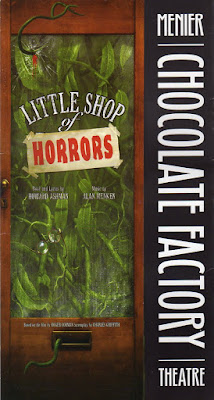First performed: 1982, Orpheum Theatre, NY
First seen by me: 1983, Comedy Theatre, London
Productions seen: three
Score: Alan Menkin / Howard Ashman
Score: Alan Menkin / Howard Ashman
Book: Howard Ashman
Plot: At Mushnik's Skid Row Florists, Seymour has an unrequited love for his co-worker, the sweet-natured but dumb blonde Audrey. In a desperate attempt to entice customers, Mushnik allows Seymour to display a weird plant, that appeared suddenly during a total eclipse, that Seymour calls Audrey II. Seymour cuts his finger and discovers Audrey II responds to drops of blood. Audrey II comes to life and offers Seymour all he has ever wanted in life as long as it keeps being fed blood.. anybody's blood...
Five memorable numbers: SUDDENLY SEYMOUR, LITTLE SHOP OF HORRORS, SOMEWHERE THAT'S GREEN, SKID ROW, DENTIST!
Back in the September of 1983 I was bereft as my favourite obsession - Richard Eyre's production of GUYS AND DOLLS at the Olivier Theatre - had lost most of it's glorious cast; G&D was the show that gave me the Pauline conversion to the glory of theatre and I was faced with that aching reality of loving a show... all things must come to an end. No more Julia McKenzie, John Normington, Bill Paterson, David Healy or Harry Towb. The good news was that Harry Towb was going straight into a new musical at the Comedy Theatre called LITTLE SHOP OF HORRORS. Being a film buff I knew of the 1960 Roger Corman comedy-thriller film so I went along to see a preview with an idea what I was going to see but primarily to see 'Uncle' Harry. I reeled out of the Comedy a few hours later, with a new musical obsession!
One of the pleasures looking back on theatre memories is you can identify great performances as they stand out down the years, and I am proud that I can say I saw Ellen Greene as Audrey onstage. It was a truly remarkable performance - as two-dimensional as a cartoon, but played with sudden depths of feeling and emotion to make her a totally lovable, totally original creation. And that voice... soft as a fake-fur coat when she sang her longing ballad SOMEWHERE THAT'S GREEN and the power seen during her moments in SKID ROW was let loose during the huge duet SUDDENLY SEYMOUR when poor Barry James as Seymour had to hang on to the set for his life when she released the full belt in the line "He don't condescennnnnnnnnnnnnnnnnd" was one of the great theatre moments I have seen (and felt). Barry James was a delightfully endearing schlubb as Seymour, the thrillingly deep evil of Michael Leslie's baritone voice made Audrey II fully come alive and Terence Hillyer was a hoot in his various characters but mainly as Orin Scrivello - DDS - the sadistic dentist boyfriend of Audrey who deservedly became the first victim in Audrey II's jaws. Popping up throughout the show were the holy trinity of Nicola Blackman, Dawn Hope and Shezwae Powell as Chiffon, Crystal and Ronette, three urchins who invited us into the show and sang us out to our doom as Audrey II's tentacles landed on our heads as their last note ended. And 'Uncle' Harry? He was glorious of course, holding the show steady with his stage experience and comic timing. Howard Ashman's tight direction - tight as Audrey II's jaw-snap - his genuinely witty script and delicious 60s retro-score with Alan Menkin made the show absolutely irresistible.
Again the spectre of theatre-going descended as one by one the original cast left - and while the show was still enjoyable in itself, the magic of that original cast dissipated over it's near-two year run. Memories of a naff touring production starring Su Pollard were luckily swept away by Matthew White's Menier production which gave Sheridan Smith a great showcase for her comedy and musical talents, and she was well partnered by Paul Keating as Seymour and, in a nice touch, Barry James as Mushnik. I couldn't bring myself to see the recent revival which looked over-stated and under-cast, when you have seen the best you really have to curate your memories to keep them fresh. Of course, Ellen Greene managed to preserve her Audrey in the 1986 film version, after a long wait when Cyndi Lauper was considered, but although it has a cult following - and the fantastic Levi Stubbs of The Four Tops voicing the killer plant - if you had seen the original stage production, it's pace is leaden and obvious.
Happily for posterity - and me - Ellen's rendition of SOMEWHERE THAT'S GREEN was filmed for the 1983 Standard Drama Awards show where the show won Best Musical, so here she is mixing the comic and the pathos for an unforgettable experience, attended by the trio of Nicola Blackman, Shezwae Powell and Dawn Hope.












